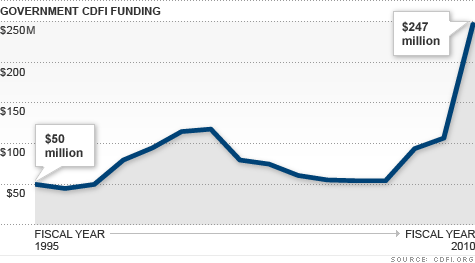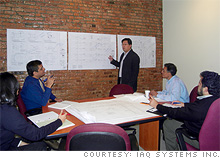Search News
 Community Development Financial Institutions (CDFIs) have been a rare small business lending success story this year -- and next year, they'll have more cash.
Community Development Financial Institutions (CDFIs) have been a rare small business lending success story this year -- and next year, they'll have more cash.NEW YORK (CNNMoney.com) -- Goldman Sachs' banking titans and top congressional Democrats don't often see eye to eye -- executive pay caps, anyone? But here's something the megabank and Capitol Hill agree on: One of the best ways to get financing to worthy small businesses is through a little-known community lending vehicle called a CDFI.
Taken together, Goldman Sachs and the federal government have earmarked more than $300 million to invest in these local financiers in 2010. Compared to Wall Street's bailout billions, that's pennies on the dollar, but for CDFIs it's a jackpot. Next year's funding pool is almost three times bigger than any they've ever had before.
 |
| A $200,000 loan from Seedco Financial will help IAQ Systems weather the downturn. |
A CDFI is a Community Development Financial Institution, a certification conferred by the Treasury Department. The program gives low-interest government loans, grants and tax credits to organizations that specialize in economically developing low-income and otherwise underserved markets.
CDFIs were a hot topic at the small business lending forum Treasury Secretary Timothy Geithner convened last month to brainstorm solutions to the ongoing credit crunch small companies face. Wary of lending to firms struggling through the recession, banks slashed their small business credit this year.
That left CDFIs, which specialize in riskier loans, scrambling to pick up the slack. Funding requests surged. For the 2010 fiscal year, the CDFI Fund received applications totaling $467 million, a 97% jump from 2009.
Entrepreneur William Ortiz-Cartagena turned to the Opportunity Fund, a California CDFI, for the $10,000 loan that launched his San Francisco parking logistics company. Gentle Parking now has a staff of 12.
"It was very hard to start this company, because traditional lending institutions were just 'no, no,' just not even see me in the door," Ortiz-Cartagena told attendees at the lending forum. "I couldn't even get an appointment with a traditional institution."
Opportunity Fund got Ortiz-Cartagena the money he needed and walked him through the steps of starting a business. "They really sit down with you and make sure that first your business plan is viable -- that it can be successful -- and then help you throughout the process," he said.
The success CDFIs have had getting money out into communities through the downtown is now being rewarded. For fiscal year 2010, Congress appropriated $247 million for the Treasury's CDFI Fund, a funding level President Obama signed into law last week. That's a giant jump from the $107 million the fund got in 2009.
Goldman Sachs (GS, Fortune 500) added more financial fuel with the "10,000 Small Businesses" initiative it launched last month. Over the next five years, Goldman Sachs will dole out $300 million to CDFIs across the U.S. A bank spokesman said $50 million of that money will be distributed through grants, with loans making up the other $250 million.
Community development financiers routinely depend on bank loans and philanthropic donations to fill their coffers, but Goldman's cash wad is of record size. It's the largest single-source CDFI funding pool specifically dedicated to small business financing, according to Mark Pinsky, CEO of the Opportunity Finance Network, an industry trade group.
Goldman Sachs said it chose to work through CDFIs because of their track records and community expertise.
"They have deep knowledge of local markets and relationships with the borrowers and businesses that are the least-served by the traditional banking system," said Alicia Glen, managing director of Goldman Sachs' Urban Investment Group.
The first CDFI to get an infusion of Goldman capital is Seedco Financial in New York City. The organization landed a $20 million loan, which it will in turn begin lending out early next year.
Part of the money will go to create a new financing program aimed at more mature small companies. Seedco will target businesses that have been around for at least three years, generate annual revenue of $300,000, and have five or more employees.
"We believe that in the $50,000 to $250,000 -- and even up to $750,000 -- loan amount range, we will be able to have a more material positive impact," said Lesia Bates Moss, president of Seedco Financial.
Targeting small but established companies serves a key goal of both Seedco and Goldman Sachs: Financing job creation.
For one small engineering firm in New York City, a recent Seedco loan is translating directly into financial salvation and two new jobs.
Founded in 2003, IAQ Systems grew steadily until the end of 2008, when the recession hit home.
"We have been hammered on the payment part," IAQ founder and President Sai Barade said. "We were not getting paid on time, and the demand was such that we had to deliver. The ends were not meeting; there was a big gap."
Late last year IAQ landed a contract with the New York City school system that will yield $8 million over three years. But to get that work moving, IAQ needed a loan to make payroll and cover overhead costs.
The company previously tapped bank lines of credit, but "at the end of 2008, all the banks were shrinking away from giving us any lines or loans," Barade said.
Seedco Financial turned around a $200,000 loan within two weeks. "Seedco was very responsive," Barade said. "They understood where we were." The company has 10 employees now and plans to soon add two more.
It doesn't take even $200,000 to create jobs, though. Opportunity Fund, the San Jose, Calif., lender that financed William Ortiz-Cartagena's parking business, has an average loan size of $7,000. Its target borrower has one to five employees.
"There is this credit crunch for small businesses, and there is this reality that we need more loans to flow to small business if we are going to have a robust job creating recovery," said Eric Weaver, Opportunity Fund's CEO and founder.
Opportunity Fund has developed a niche lending to day care and health care providers who work out of their homes. Its interest rates typically run from 6% to 8%.
"For a very small amount of capital, you can start or expand that business," Weaver said. "It is hard work, but it is very important work and it is real income to a family." ![]()



| Overnight Avg Rate | Latest | Change | Last Week |
|---|---|---|---|
| 30 yr fixed | 3.80% | 3.88% | |
| 15 yr fixed | 3.20% | 3.23% | |
| 5/1 ARM | 3.84% | 3.88% | |
| 30 yr refi | 3.82% | 3.93% | |
| 15 yr refi | 3.20% | 3.23% |
Today's featured rates:



| Index | Last | Change | % Change |
|---|---|---|---|
| Dow | 32,627.97 | -234.33 | -0.71% |
| Nasdaq | 13,215.24 | 99.07 | 0.76% |
| S&P 500 | 3,913.10 | -2.36 | -0.06% |
| Treasuries | 1.73 | 0.00 | 0.12% |
| Company | Price | Change | % Change |
|---|---|---|---|
| Ford Motor Co | 8.29 | 0.05 | 0.61% |
| Advanced Micro Devic... | 54.59 | 0.70 | 1.30% |
| Cisco Systems Inc | 47.49 | -2.44 | -4.89% |
| General Electric Co | 13.00 | -0.16 | -1.22% |
| Kraft Heinz Co | 27.84 | -2.20 | -7.32% |
|
Bankrupt toy retailer tells bankruptcy court it is looking at possibly reviving the Toys 'R' Us and Babies 'R' Us brands. More |
Land O'Lakes CEO Beth Ford charts her career path, from her first job to becoming the first openly gay CEO at a Fortune 500 company in an interview with CNN's Boss Files. More |
Honda and General Motors are creating a new generation of fully autonomous vehicles. More |
In 1998, Ntsiki Biyela won a scholarship to study wine making. Now she's about to launch her own brand. More |
Whether you hedge inflation or look for a return that outpaces inflation, here's how to prepare. More |